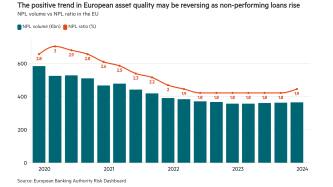Members of the European parliament voted earlier this month to pass a new regulation, provisionally agreed last year, requiring payment providers in the Single Euro Payments Area to enable instant payments, capped at €100,000, in 10 seconds or under. The regulation provides a boon to an area that has struggled to take off. Experts believe banks could play a role in developing it further.
The new rules will enter into force 20 days after they are published in the Official Journal of the EU. Providers located in the euro area will then have nine months to be ready to receive instant credit transfers and 18 months to be ready to send them.
“This regulation will ensure that instant payments become ubiquitous,” says Bruno Mellado, global head of payments and receivables at BNP Paribas. Currently, there is some way to go. While many providers already have the capability to enable instant payments, only 16 per cent of credit transfers in Sepa are processed as instant payments. But the new mandate will be key to supercharging this shift, argues Mellado. The regulation also declares that providers cannot impose higher charges for instant payments.
Enrico Camerinelli , strategic advisor at Datos Insights, is currently undertaking extensive research into corporate use of instant payments and is not convinced the benefits of instant payments are necessarily universally — or even widely — applicable. “Instant payments are not always necessary, not always indispensable. What companies are doing now, what I’m seeing is they’re trying to find use cases and evaluating whether doing them instantly is going to bring benefits or not,” he says.
Camerinelli sees a role for banking-as-a-service. He argues that banks and payment services providers should identify real benefits and step in and make the case to relevant corporate clients and SMEs, and demonstrate the value — if any — that instant payments might bring.
“A business might have a situation where a supplier might consider ‘invoice discounting’ if they are paid instantly — this could offer corporates potential benefits that they might not yet realise,” he says.
Laurent Descout, founder and CEO of Neo, a platform for foreign exchange treasury services, also believes efficiencies in both time and cost are the core benefits to business. “This move can enable merchants and corporates to optimise their liquidity, resulting in more efficient cash management. It means businesses can also lower their transaction and working capital costs through a reduced settlement lag and smoother reconciliation process,” he says.
Mellado points to the regulation as being key to bringing about a “harmonised” verification process. Under the regulation, instant payment providers will need to verify that the beneficiary’s international bank account number and name match, with all relevant checks in place, otherwise the provider becomes liable for any fraud or error.
There could be some hurdles in terms of what the protocol looks like for alerting parties to a potential beneficiary mismatch. This is down to how the Payments Services Directive — Europe’s legal framework for Sepa — has been transposed up to this point by individual countries.
“Some countries decided that only account numbers had to match; others required both the account name and number. So right now, countries are not harmonised,” says Mellado. The European Payments Council will ultimately publish the rulebook on the validation protocol — Mellado expects this will be sometime in July.
Use cases
Some of the more interesting use cases are yet to be fully realised, such as novel ways of managing payroll, according to Mellado.
“Imagine if you’re working on an hourly basis, if you know that the more hours you worked on a Friday night you would get paid more that same evening,” he says. “The old way would be to receive that payment the following Monday or whenever the HR department says so, but instead you could have more intelligent solutions that say ‘you’ve done the work for me, so you’ll get paid straight away’.”
He pointed to Canadian research that found 36 per cent of gig economy workers believed that “time to getting paid was a pain point” with 68 per cent of workers saying “they would likely choose real-time payments” when it was available.
A piece of the puzzle that will make a big difference in uptake, Mellado says, will be the commercial launch of Wero, the European Payments Initiative’s digital wallet, which can support account-to-account transfers. Its inaugural transaction was sent from a German account to a French account leveraging instant account-to-account payments infrastructure in mid-December 2023, with a commercial launch scheduled for later this year in Belgium, France and Germany. “Wero will be a key element to drive the adoption for both individuals and businesses,” he says.
But while Mellado predicts an increase in use cases, adoption and applications for instant payments, he does not predict an end to the usefulness or role of cards.
“I believe in the end we will have a set of tools available. Individuals and businesses will decide which one is the best for them and the other party they’re interacting with. Certainly an account-to-account payment will be less costly, and potentially more convenient for both — but it’s about having a better set of tools to pay more scenarios in more use cases than today,” he says.
Camerinelli is more direct, saying: “Instant payments are not going to remove traditional methods of payments.” He points to the value of slower payments, which are a benefit to some. “Consumers and companies, in many instances, have the benefit of knowing that what they’re paying today won’t be charged to their bank account until later. That is a credit — why should they just give that up? Visa and Mastercard will still sleep well at night.”
The article was amended after publication to reflect Bruno Mellado's expectation that the EPC's rulebook will be released in July, and not in December as previously stated












